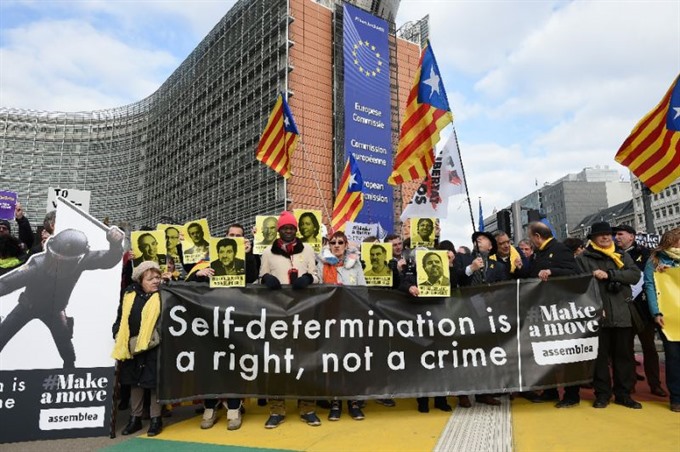 World
World

Spain's prime minister is expected to call an early general election on Friday, the third in less than four years, after his draft budget was rejected in parliament over the Catalan secession crisis.
 |
| Sanchez’s socialists have already adopted a campaign-like tone, accusing Catalan separatists and conservatives of blocking a budget that included many social spending measures. — AFP Photo |
MADRID — Spain’s prime minister is expected to call an early general election on Friday, the third in less than four years, after his draft budget was rejected in parliament over the Catalan secession crisis.
Pedro Sanchez took power just over eight months ago after he ousted his conservative rival in a dramatic parliamentary no-confidence vote.
At the head of a fragile minority government, the 46-year-old has had to rely on the support of unlikely bedfellows in parliament, including the far-left Podemos party, Basque nationalist lawmakers and -- crucially -- 17 Catalan separatist MPs.
On Wednesday, these groups joined right-wing lawmakers in rejecting his budget.
They withdrew their backing in protest at separatist leaders being put on trial for their role in a 2017 attempt to break Catalonia from Spain.
Budget Minister Maria Jesus Montero told Spanish radio that Sanchez would call elections on Friday and that they would take place this year, but gave no further details.
The government later said Sanchez would make a statement at 10am (0900 GMT) Friday after a special cabinet meeting.
Sanchez’s socialists have already adopted a campaign-like tone, accusing Catalan separatists and conservatives of blocking a budget that included many social-spending measures.
"The right wing in this country is trying to put a brake on the social progress of this budget and this government," Montero said after the budget rejection.
"It’s trying to stop this country from moving forward," she added.
The government has also given the media a document promoting its short track record: from a rise in the minimum wage and restoring universal health care to financing measures against gender-based violence.
Turbulent term
"It’s the end of an atypical, turbulent term," said Paloma Roman, politics professor at Madrid’s Complutense University.
Sanchez has been savaged by the conservative Popular Party (PP), centre-right Ciudadanos and more recently small, far-right party Vox.
Last Sunday, they called a big protest in Madrid to ask for early elections.
One of their biggest bugbears has been the socialist government’s negotiations with Catalonia’s separatist executive as Madrid tries to ease tensions with the northeastern region.
While Madrid says it initiated talks to try and find a way out of an ongoing crisis, the opposition has accused it of yielding to separatist demands merely to stay in power.
Several opinion polls see Sanchez’s Socialist party winning elections but likely unable to form a majority in parliament, even with Podemos.
Polls say the PP, Ciudadanos and Vox -- which has surged recently thanks to its hard line against Catalan separatism -- could be able to form a majority.
That would lead to a coalition government with the PP and Ciudadanos, formed with the support of Vox -- which is what happened in the southern region of Andalusia after local polls there in December.
"Tensions between the central government and Catalonia are likely to increase in this scenario," said Steven Trypsteen, ING economist for Spain and Portugal.
The other scenario, he said, could be that the right-wing bloc does not get enough lawmakers to form a majority.
In that case, "political gridlock" would be possible, he said. — AFP




